Why Money Making Can Be Challenging: And What You Can Do About It
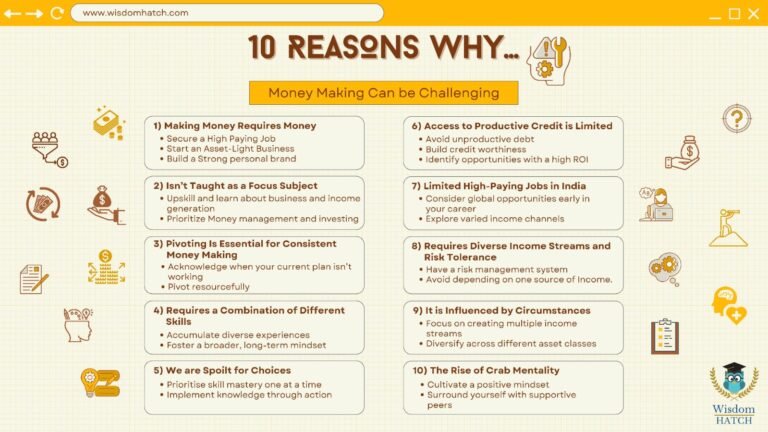
Introduction:
In today’s fast-paced world, making money can sometimes feel like a wild roller coaster ride. Whether you’re a student with dreams of financial success, a seasoned professional, or a hopeful entrepreneur, the road to riches can be riddled with twists and turns. This holds especially true for those of us in India, where the money-making game is evolving rapidly.
So, hop on board as we explore:
- 10 Practical reasons why MONEY MAKING is getting harder in India
- What can you do to overcome these challenges and achieve Financial Freedom?
10 Reasons Why Money Making Can Be Challenging:
1. Making Money Requires Money:
There are typically four active options to make money:
• Get a High Paying Job:
- Securing a high-paying job in India is increasingly challenging due to a lack of white-collar positions.
- The number of high quality jobs are not large enough to keep up with the demand in the country [1] .
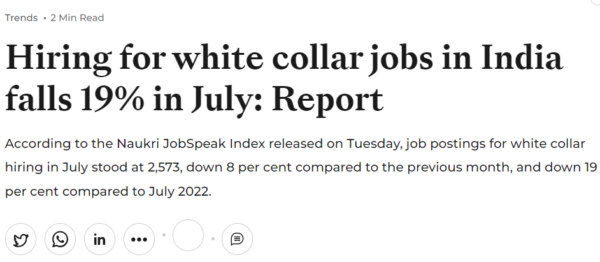
- While this was a popular option for previous generations, the current cost of capital (borrowing rates) has risen significantly [2].
- This has made it increasingly expensive to establish such businesses .
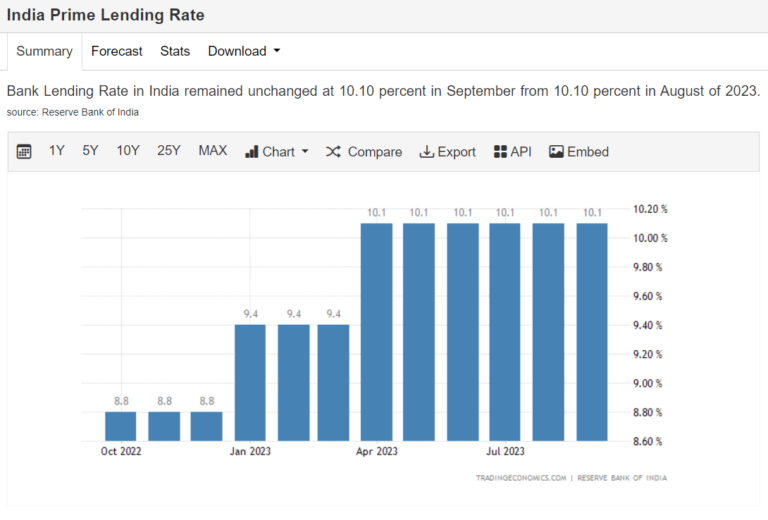
• Start a Big Business:
- Establishing a large business in India is extremely difficult due to existing monopolies [3].
- Capital-intensive businesses have high entry barriers and are often unsustainable, except for the tech industry.

•Invest Your Money Properly:
- Identifying good investments today is becoming more difficult.
- Previous generations saw significant wealth generated through real estate investments, but this avenue is now less straightforward [4].

So, what can you do to navigate this situation?
• Build a strong personal brand:
- If you’re at a young age, focus on this aspect.
- Attend a reputable college, maintain good grades, and gain experience at established companies.
- This will increase your chances of landing high-paying jobs and building wealth through active income.
• Being a founder and securing funding isn’t a guaranteed path to wealth:
- The odds of becoming wealthy by founding startups are slim.
- Even if you create a successful company, substantial profits often come only when the company goes public.
• Start an Asset-Light Business:
- When you lack heavy capital, consider ventures like digital businesses, content creation, blogging, consulting, or courses.
- These endeavors can offer higher profit margins if they gain traction.
- Domestic Demand in India is high for the services sector and can be utilized [5].
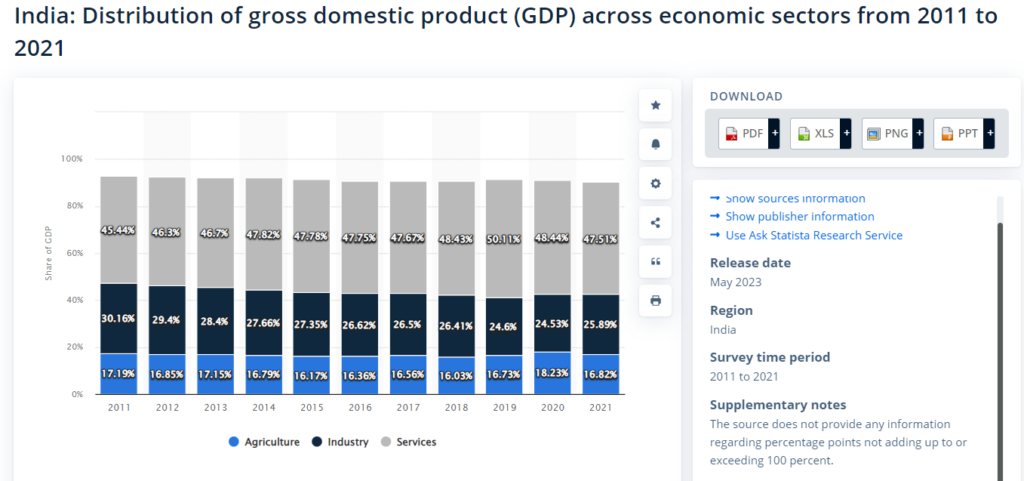
2. Money Making Isn't Taught as a Focus Subject:
• In Indian culture, discussing money openly is often taboo.
- Schools primarily focus on academic performance and neglect practical money-making skills.
- As a result, students receive little exposure to concepts such as building businesses, money management, tax knowledge, or sensible investments.
• Furthermore, mentorship and apprenticeship are uncommon in India, unlike countries like Germany, which glorify these concepts.
- Germany even has initiatives to promote and maintain apprenticeships [6].
- This lack of guidance leaves people in their 30s and beyond clueless about money making and management.
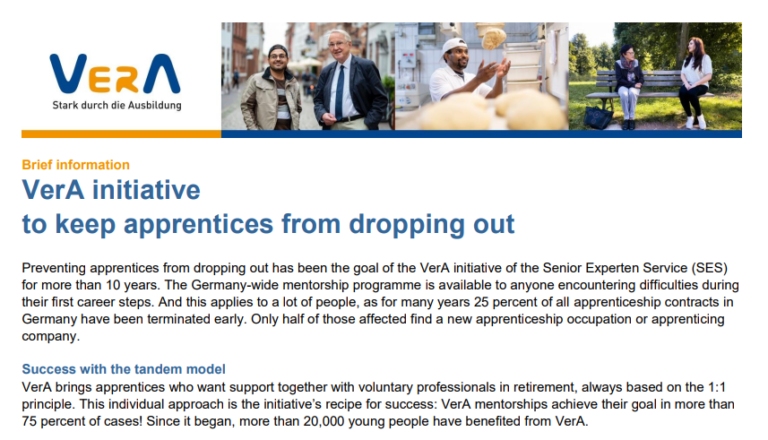
Now that you recognize the issue, what can you do?
- Upskill and learn about business and income generation.
- Engage with content that aligns with your interests and can be replicated.
- Educate yourself about money management and sensible investing.
If you’re interested in investing or learning more about investment concepts, you can join my YouTube community, where I cover various topics and provide stock-specific commentary on the Stock Market.
3. Money Making Requires a Combination of Different Skills:
• Money making demands proficiency in multiple skills.
- This may include anything from generating passive income and investing sensibly, to entrepreneurship and recognizing new opportunities.
- This applies not only to business owners but also to employees.
• It has become common for people to resist acquiring such skills because they are comfortable in their primary job roles.
- For example, many individuals shy away from sales-related opportunities, even though sales is a critical skill for boosting income.
Therefore, focus on:
- Gaining experience across various roles and opportunities.
- Adopting a broader mindset and taking a long-term perspective.
4. Money Making Is Influenced by Circumstances:
- Income and wealth inequality are increasing not only in India but also globally.
- The chart below [7] clearly shows that the top 1% earners in India used to control 11.87% of the total wealth in 1961, and as of 2020 they control almost 31.55%. Similarly, top 10% earner wealth control has gone up from 43.18% to 63.68% However, the bottom 50% have gone lower and lower from 12.29% to 6.12%.

- This suggests that the next two decades in India will be marked by intense competition and wealth concentration.
To thrive in this competitive environment, build a wide range of skills:
- Learn more about money-making strategies.
- Explore different asset classes for income generation.
- Learn how to start and grow a business.
5. We Are Spoilt For Choices:
• Sensible investing has become increasingly challenging with the availability of numerous investment options [8].
- This includes anything from direct stocks and mutual funds to ETFs, gold, real estate, bonds, and many more.
- The sheer variety of choices can be overwhelming.
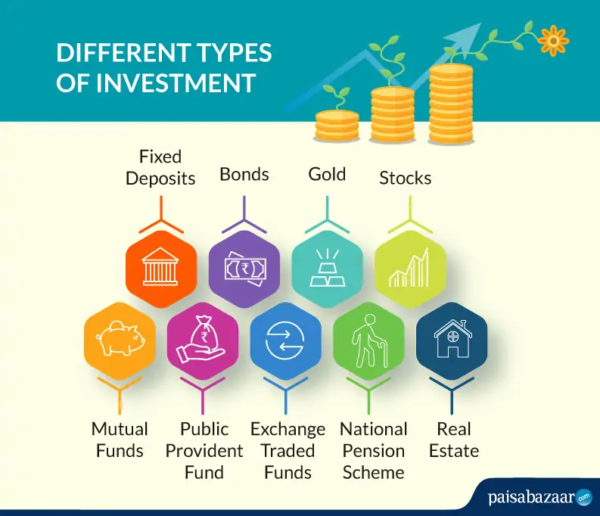
This abundance of options extends beyond investments:
- Choosing from thousands of courses and videos when learning something new.
- Selecting from a vast array of books when you want to start reading.
- Deciding on the type of business to start with numerous possibilities.
To overcome this situation:
- Focus on mastering one skill at a time.
- Take action on what you learn; don’t just consume information without applying it.
- Recognize that your time is precious; treat it as your most valuable asset.
6. Access to Productive Credit Is Limited:
• Obtaining a personal loan for non-productive consumption, such as buying a smartphone, is easier than securing an educational loan.
- While educational loans require more capital and may require collateral, they offer greater benefits to individuals and the nation by promoting productive debt.
- From 2015-19, the number of education loans disbursed went down by 25% [9].
- This number has gone up in 2023, but the overall trend doesn’t look promising.

- Easy access to personal loans for non-productive consumption has led to a surge in personal debt across India [10].
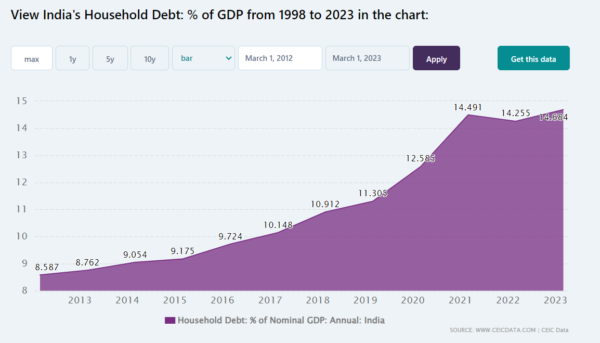
•To harness the power of productive loans:
- Seek out productive credit with lower interest rates.
- Identify opportunities with a high Return on Investment (ROI).
7. Limited High-Paying Jobs in India:
- India is often regarded as a low-cost labor option, resulting in many outsourced jobs being low-paying.
- The youth unemployment rate has gone up significantly over the past 20 years, currently sitting at almost 24% [11].
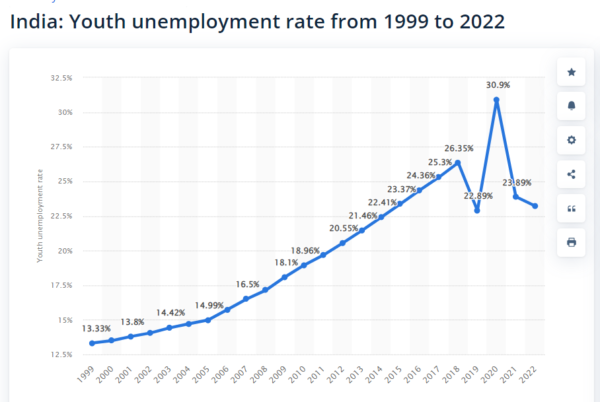
• There are also cases where during the startup sector boom in 2020-21, startups promised high salaries to employees through Employee Stock Option Plans (ESOPs), which often failed to materialize [12].
- The current startup landscape has become challenging, with many companies struggling to meet their promises to employees.
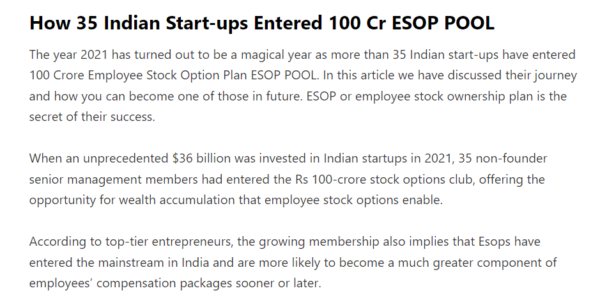
What can you do to address these issues?
- Consider opportunities outside India early in your career to accumulate wealth abroad.
- Explore various money-making skills and create multiple income streams.
- Return to India if you believe in its growth story after amassing some wealth.
8. Money Making Requires Diverse Income Streams and Risk Tolerance:
- Effective money making involves the ability to diversify income streams and a willingness to take calculated risks, such as changing jobs or starting a business.
- However, risk-taking has not always been encouraged in Indian culture, although this attitude is gradually changing.
9. The Rise of Crab Mentality:
- Crab mentality refers to individuals in a group who try to hinder someone’s efforts to improve their life or situation, akin to crabs in a bucket pulling each other down.
- This negative mentality is often observed on social media, where contrarian thinking is ridiculed.
As an educated and aspiring individual, consider these strategies:
- Train your mind to ignore negative mentality.
- Surround yourself with supportive people who uplift you.
10. Pivoting Is Essential for Consistent Money Making:
- Pivoting involves adapting your strategy or direction when your current plan isn’t working.
- It requires acknowledging past failures, learning from them, and applying those lessons to your next endeavor.
Point to keep in mind to ace your Money Making Skill:
- Build a strong personal brand and seek high-paying job opportunities.
- Take calculated risks while focusing on risk mitigation.
- Explore diverse income-generating avenues.
- Gain experience in various fields to gain valuable insights.
- Be prepared to pivot when necessary.
- Establish multiple income sources to reduce reliance on a single stream.
Conclusion
While the journey to financial success may resemble a thrilling roller coaster, it’s a ride you can conquer. Embrace change, continuously improve your skills, and take control of your financial future to navigate the twists and turns of the money-making world.
So, whether you’re pursuing your dream job, contemplating a business venture, or exploring investment opportunities, stay tuned for valuable insights that will guide you toward financial prosperity. Making money may pose challenges, but with the right approach, you can turn those challenges into an exciting adventure toward financial freedom!
Remember, the path to financial success is not only about making money but also about making wise choices that lead to lasting prosperity. By combining knowledge, skills, and determination, you can overcome the hurdles and create a brighter financial future for yourself and those around you.
- Making money in India is increasingly challenging due to limited high-paying job opportunities and rising costs for small businesses.
- Schools in India often neglect to teach practical money-making skills, leaving students unprepared for financial success.
- Lack of mentorship and apprenticeship opportunities in India further hinder individuals from learning about money management and sensible investments.
- Money-making requires a combination of skills, including passive income generation, entrepreneurship, and recognizing new opportunities.
- Income and wealth inequality are increasing, suggesting intense competition and wealth concentration in the next two decades.
- The abundance of choices in investments and learning options can be overwhelming, so it’s essential to focus on mastering one skill at a time.
- Access to productive credit is limited in India, leading to a surge in personal debt from easy-to-obtain non-productive loans.
- India is known for low-cost labor, resulting in many outsourced jobs being low-paying, contributing to youth unemployment.
- Money-making involves diversifying income streams and taking calculated risks, with risk-taking gradually becoming more encouraged.
- Crab mentality, where people hinder others’ progress, is a negative influence, so surround yourself with supportive individuals.
- Pivoting and adapting your strategy when necessary is crucial for consistent money-making success.
- In conclusion, achieving financial success in India requires continuous skill improvement, adaptation to changing circumstances, and wise choices. Embrace the challenges as an exciting adventure toward financial freedom.
[1] https://hr.economictimes.indiatimes.com/news/trends/hiring-for-white-collar-jobs-in-india-falls-19-in-july-report/102333040
[2] https://tradingeconomics.com/india/bank-lending-rate
[3] https://www.vox.com/the-goods/22550608/how-big-business-exploits-small-business
[4] https://www.businesstoday.in/magazine/economic-slowdown/story/indian-real-estates-downward-slide-how-high-home-prices-rising-interest-rates-are-denting-the-sector-359593-2023-01-10
[5] https://www.statista.com/statistics/271329/distribution-of-gross-domestic-product-gdp-across-economic-sectors-in-india/
[6] https://vera.ses-bonn.de/fileadmin/user_upload/VerA_Infoblatt_2022_EN.pdf
[7] https://www.theindiaforum.in/economy/trends-economic-inequality-india
[8] https://www.paisabazaar.com/mutual-funds/what-are-the-different-types-of-investment/
[9] https://www.crifhighmark.com/news-events/news/2019/may/education-loans-in-india-shrink-25-in-4-yrs-crif-insights
[10] https://www.ceicdata.com/en/indicator/india/household-debt–of-nominal-gdp
[11] https://www.statista.com/statistics/812106/youth-unemployment-rate-in-india/
[12] https://muds.co.in/35-indian-start-ups-entered-100-cr-esop-pool/
Ever wondered what we get in return for the taxes we pay in India. Whether the Tax Structure is TOXIC? Check out our Blog post on HEAVY TAXES, But we get NOTHING in return
MUST know BEFORE you become an Airbnb host
Medium Article Preksha Chand edit post MUST know BEFORE you become an Airbnb host Medium Article Preksha Chand edit post MUST know BEFORE you become an Airbnb host Medium...
Make more money from your property: Short-term rental [Airbnb]
Medium Article Preksha Chand edit post Make more money from your property: Short-term rental [Airbnb] Medium Article Preksha Chand edit post Make more money from your property: Short-term rental...
GOA Airbnb Laws: What Hosts Need to Know [2024]
Medium Article Preksha Chand edit post Make more money from your property: Short-term rental [Airbnb] Medium Article Preksha Chand edit post Make more money from your property: Short-term rental...





